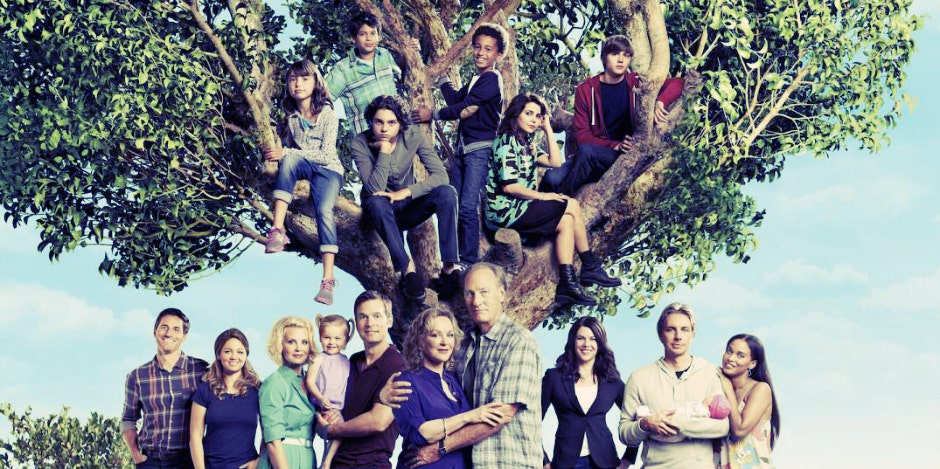5 Real-Life Lessons We Learned From 'Parenthood' (Thank You!)
We laughed. We cried. And now we say goodbye to the family we all wished were our own.

We laughed. We cried. And now we have to say goodbye to Parenthood, what I consider to be the most realistic family show ever on television. Here's a look at the lessons the show taught us through the years.
We learned ...
1. To Look at situations with more compassion.
One of the main storylines surrounded Max Braverman, the son of Adam and Kristina who had Asperger's syndrome.
The show never shied away from the fact that, as parents, Adam and Kristina not only had to figure out how to get him through middle school and beyond, but how to communicate with him and make adjustments to their parenting style for him to thrive.
Adam, who for the most part is the stern, no-nonsense guy in the family, often allowed Max a little freedom to explore and to take risks.
Kristina, probably out of fear, was more cautious about Max's adventures, but like a true mom, challenged him to grow.
She helped him run for student body president and even allowed her sister's boyfriend to mentor him because Max finally had found something he was passionate about—photography.
The show also took on issues surrounding interracial marriage, single motherhood, returning military veterans, absent dads, breast cancer, adoption, abortion, step-parenting and aging in a way no TV show has ever done before, challenging viewers to look harder and closer and more compassionately at complicated situations.
2. That marriage (at every age and stage) is hard.
Joel and Julia were probably the most successful couple on the show. She was a hot-shot lawyer who worked long hours, while he was an entrepreneur who was flexible enough to handle the parenting at home, making breakfast, getting the kids to school, etc.
In Season 5, Julia lost her job, and for the first time, Joel could to step in to make up for Julia's lost wages. Julia was ready for a chance to stay home and focus on being a mom.
We watched the relationship begin to unravel as Julia questioned her self-worth while coping with the fact she wasn't great at being a mom. She was not suited or satisfied with the daily stay-at-home mom grind of breakfasts, carpool and homework.
In short, Julia had lost her way so she took it out on her husband, and, eventually, she fell into the arms of another man.
Watching Joel and Julia interact with each other and trying to co-parent was painful to watch at times, but strikingly realistic.
You saw how they had difficulty making parenting decisions and how difficult the situation was on the children. (Sydney's painful outbursts were simply soul-crushing to watch.)
Joel eventually decided to fight for his relationship, and Julia agreed to reconcile. But even then, the show pointed at the very real issues couples, even reconciling ones, have when coping with issues of infidelity.
We also got a look at the long-term effects of divorce on Sarah Braverman and her children, Amber and Drew. They all were desperately searching for a way to fill (or repair) the hole left by musician/addict Seth Holt.
3. Families don't always get along (but they always love).
Most of the conflict in the family came between brothers Adam, the sensible one, and Crosby, the unconventional one. Everyone turned to Adam for support and guidance, while Crosby was always getting into trouble.
For the most part Crosby had lived in his brother's shadow until Season 5, when they went into business together. For the first time you saw the brothers really feed off of each other's strengths as the business became successful.
Crosby was able to utilize his creative side, while Adam's straight-forward demeanor handled the day-to-day activities.
Then there was Crosby's meddling mother-in-law.
4. That an interwoven family is not necessarily an intrusive one.
Parenthood was so good because the family was very close-knit but not overly involved in everyone's lives.
They always made a point to get together for the good times, like attending Victor's first baseball game, or during bad times, when Kristina was going through her cancer treatments.
That's the way families should behave. We shouldn't feel that we have to alienate anyone from our family because they'll be up in our business.
5. To be a better, parent, child, sibling, spouse:
As the show comes to an end, they have focused on the health of the patriarch of the family, Zeek, and how his energy and quest for life held the family together.
You see the toll his failing health has taken on his family, especially his wife.
And even though his strength has diminished, he still tried to support his family, whether it was by being at the birth of his great-grandson or to standing up for his daughter at her wedding in the final episode.
I can't help, but reflect on how my family and the Bravermans are alike, and how much Zeek is like my own father.
He is just as vibrant now as he was when I was younger, but when he starts to decline, I will lean on the things I learned from this show to help me navigate this part of life.
In the end, Parenthood was honest, real and, for me, life-changing. The Bravermans were a family we all wanted to emulate, and they have helped me along the way as I navigate being a son, a husband and parent.
If you feel you are struggling in any of these three areas, especially as a husband, wife or a parent, please contact me at info@strive2succeedcoaching.com. If you mention this article, I will offer you a free 30-minute consulation.

